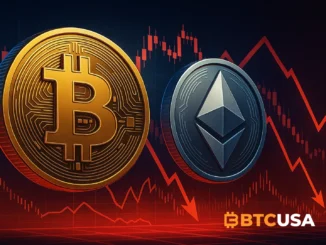
South Korean Martial Law Propels Crypto Trading Volume to Record High at $34 Billion
Crypto trading in South Korea soared into record-breaking territory in the wake of recently introduced martial law.
Record-Breaking Trading Volume
The trading volume in the top five crypto exchanges of South Korea – Upbit, Bithumb, Coinone, Korbit, and Gopax – reached a combined $34.2 billion within 24 hours, according to CoinMarketCap. That represented a 50% jump from its previous record of $18 billion set on Dec. 2 and beat the nation’s stock market trading volumes by 22%.
This surge is a direct reflection of the political unrest due to martial law, which made investors act in the shortest time possible due to the uncertain conditions.
Martial Law
The martial law, which was imposed on Dec. 3 and then lifted after six hours, introduced rigid restrictions: a ban on protests, media censorship, and suspension of parliamentary activities. President Yoon Suk-yeol explained such measures as a response to domestic unrest and external threats, while critics labeled the action unconstitutional and politically motivated.
The turmoil pushed South Korean traders to offload assets rapidly, triggering price crashes. Bitcoin plummeted to 88 million won, its lowest since October, while Ethereum dropped to 4.2 million won.
Exchange Activity Breakdown
The trading frenzy saw different exchanges handle varying volumes:
- Upbit: Dominated with $27.25 billion.
- Bithumb: Secured $6.14 billion.
- Coinone: Processed $531 million.
- Korbit: Reached $192 million.
- Gopax: Registered $9 million.
- Some exchanges reported outages due to overwhelming activity.
Market and Political Chaos
Political turmoil then ensued with protests outside parliament as opposition parties and citizens came out against the measures. Regulators found it hard to hold a meeting to vote down the martial law. Videos showed confrontations between protesters and police.
Meanwhile, the South Korean won also plunged in a spill-over effect, deepening the market’s rout. The rout mirrored the pattern seen during previous crises, including the COVID-19 pandemic and the onset of the Ukraine war.
Ripple Effects on Crypto Prices
The mass sell-off hit major cryptocurrencies, with some altcoins such as Ripple, Stellar, and Solana plummeting by double-digit declines.
Conclusion
The record trading activity underlines the strong influence of political decisions on financial markets. Though the acute phase of the crisis has passed, the sharp reaction of the crypto market in South Korea underlined its vulnerability to geopolitical events.


